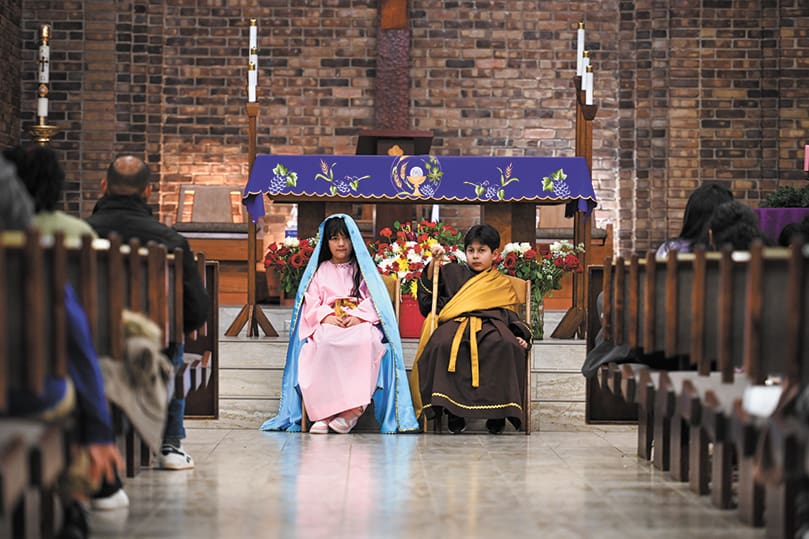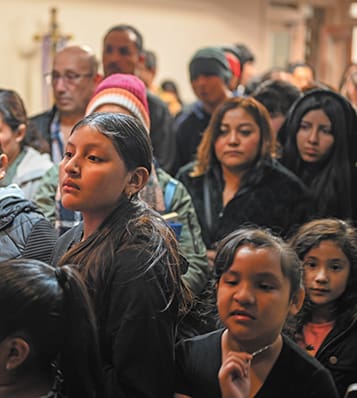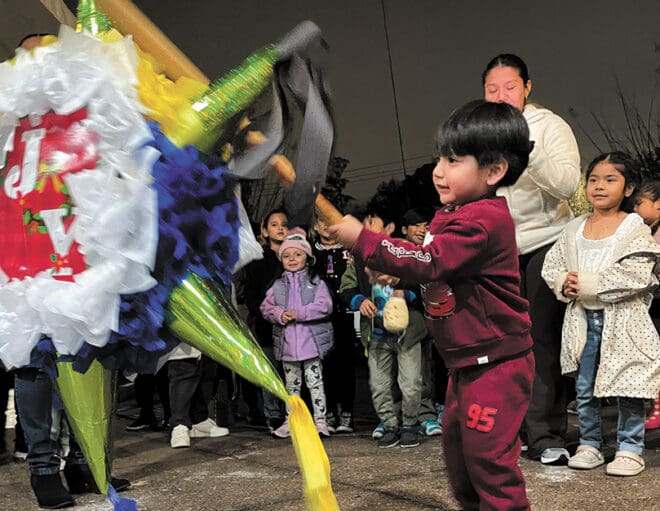 Photo by Andrew Nelson
Photo by Andrew NelsonHapeville
Hispanic families embrace the Holy Family
By ANDREW NELSON, Staff Writer | Published December 23, 2024
HAPEVILLE—For Sagrario Alvarez, the nine days of prayers at a Posada celebration remind her of walking arm in arm in the cold night with her late father.
“It’s like one of my happiest memories,” Alvarez said, a smile on her face, as she stood in the entry way of St. John the Evangelist Church.
Enrique Dominguez recalled walking among his community in his small Mexican town as a youngster carrying his own plate and cup, knowing he would be fed at the next house after knocking on the door.

A larger-than-expected crowd of 150 people attended the Posada celebration at St. John the Evangelist Church, Hapeville, on the first of its nine nights. Families treat it as a way to pass on the Mexican faith tradition to the young generation. Photo by Andrew Nelson
“We don’t want to lose that (feeling),” said Dominguez about the heartfelt emotion from decades ago. He worships at the Hapeville church.
Hispanic communities embrace the Mexican tradition of “the Posada,” sharing together the days of prayer, food and community at parishes across the Archdiocese of Atlanta. The community celebration is based on the Catholic tradition of a novena—nine days of prayers.
Posada is a popular Mexican devotion retracing Mary and Joseph’s journey to find lodging before securing shelter in the humble manger for the birth of Jesus. They begin on Dec. 16 leading to Dec. 24.
The word “posada” comes from the Spanish verb “posar,” which means “to lodge” or “to stay.”
At Immaculate Heart of Mary Church, on Dec. 15, after sunset, scores of families filled the pews. They sang, prayed the rosary and then the two young characters of Mary and Joseph began their walk in the aisles of the church sanctuary. Two angels in white robes and with large wings walked behind guarding them.
“It’s how we prepare for the birth of Christ. It reminds me of my home country. It’s a beautiful thing,” said David Nieto, who is on staff at the church. When he was young, he walked the streets in his native Mexico to people’s homes with a bright sparkler in hand. It was custom to host the events in people’s houses, where families hosted neighbors in gatherings that turned into a street celebration.
The symbol of the Holy Family starting its journey to Bethlehem with its challenges is part of the lives of many of the immigrants who worship at the Brookhaven church and in the stories passed on to their children.
Alicia Guerrero, the faith formation coordinator, said some families may be uncertain about their future with the talk of a crackdown on immigrants during the election season, but they know they are welcome here with equal dignity in God’s eyes.
“They feel part of the community,” she said.
A posada typically involves reciting the rosary and other prayers, singing holiday songs and carols, followed by traditional Mexican food to keep away the cold and with ponche, a warmed fruit punch.
No night is complete without youngsters straining to burst the piñatas to collect its candy while nearby adults tease them with rope tugging to keep the stuffed, brightly colored container of sweets just out of reach.

A youngster at Immaculate Heart of Mary Church, Brookhaven, whacks a pinata to get at the candy tucked inside. The pinata is part of the Posada celebration fun for families. Photo by Andrew Nelson
The evening not only remembers past traditions but also allows families to pass on the custom and the feeling of community to their children.
In Hapeville, Dominguez said the hours spent at the church after the day’s work is “to teach the little ones behind us.” His 19-year-old daughter, home from college, was among the crowd of teens and young adults, spilling out of Hapeville’s St. John the Evangelist Church into the dark night.
Alvarez joked that the larger-than-expected crowd of 150 people would mean stretching the pot full of pozole. The hearty dish is a traditional Mexican chicken and pork stew, garnished with shredded lettuce, onions, radishes and more.
Here at St. John, the youngsters portraying Mary and Joseph, were out in the night air knocking on the glass door. After the procession was repeatedly refused, the doors swung open and upbeat, hand-clapping songs filled the church. The young girl and boy took their seats at the foot of the altar as the hour of prayer began.
“It’s a little bit of our tradition in the United States,” said Nieto.